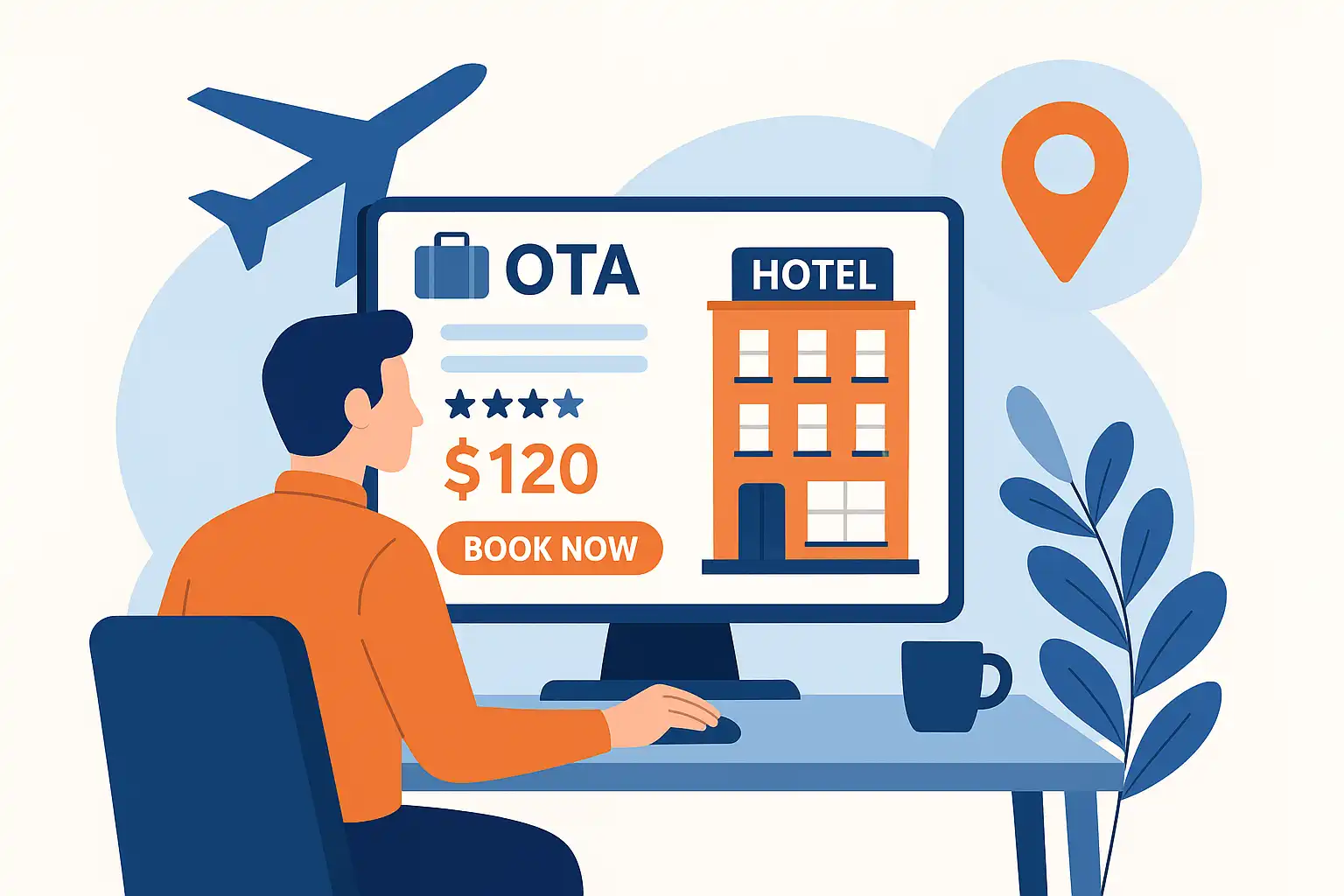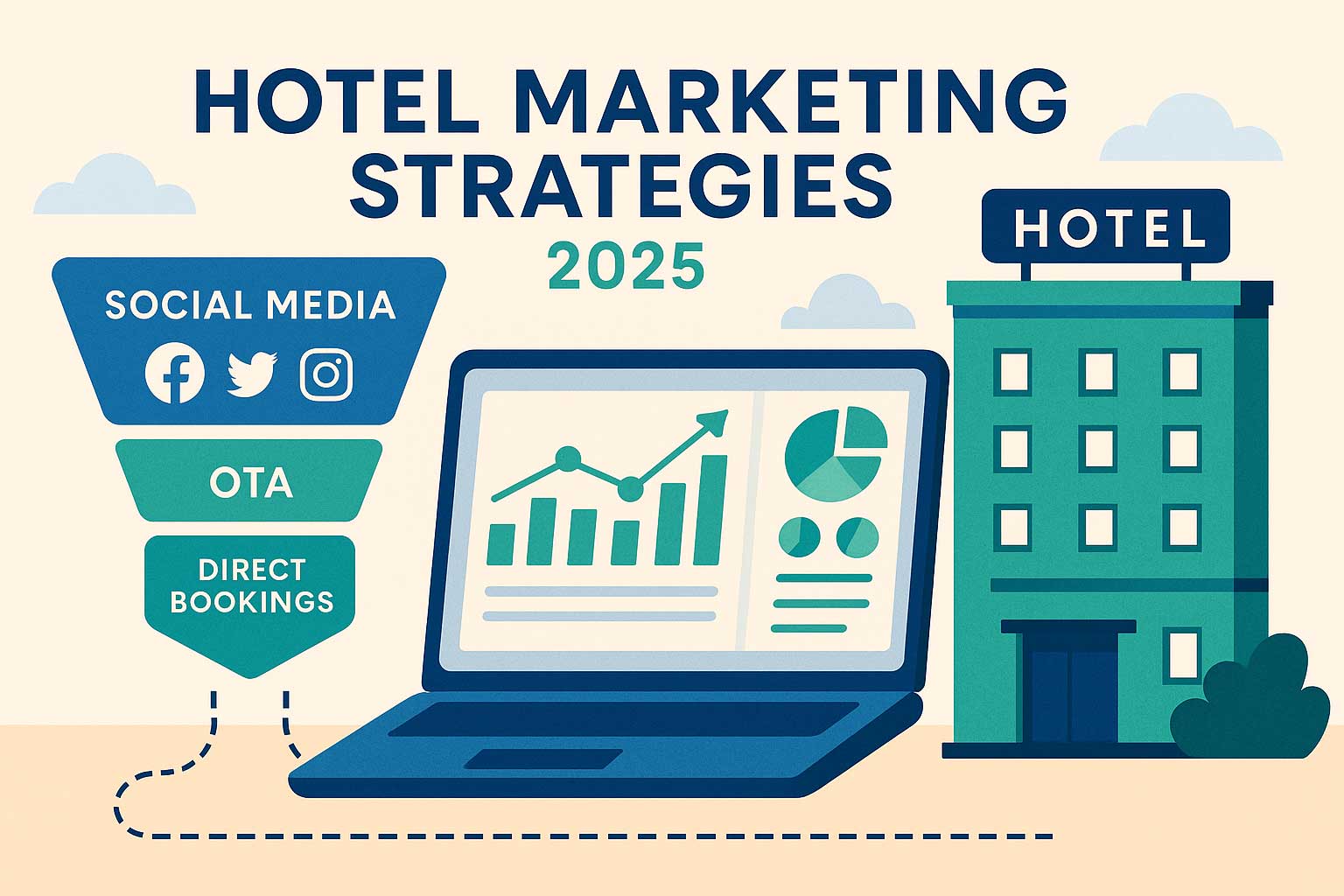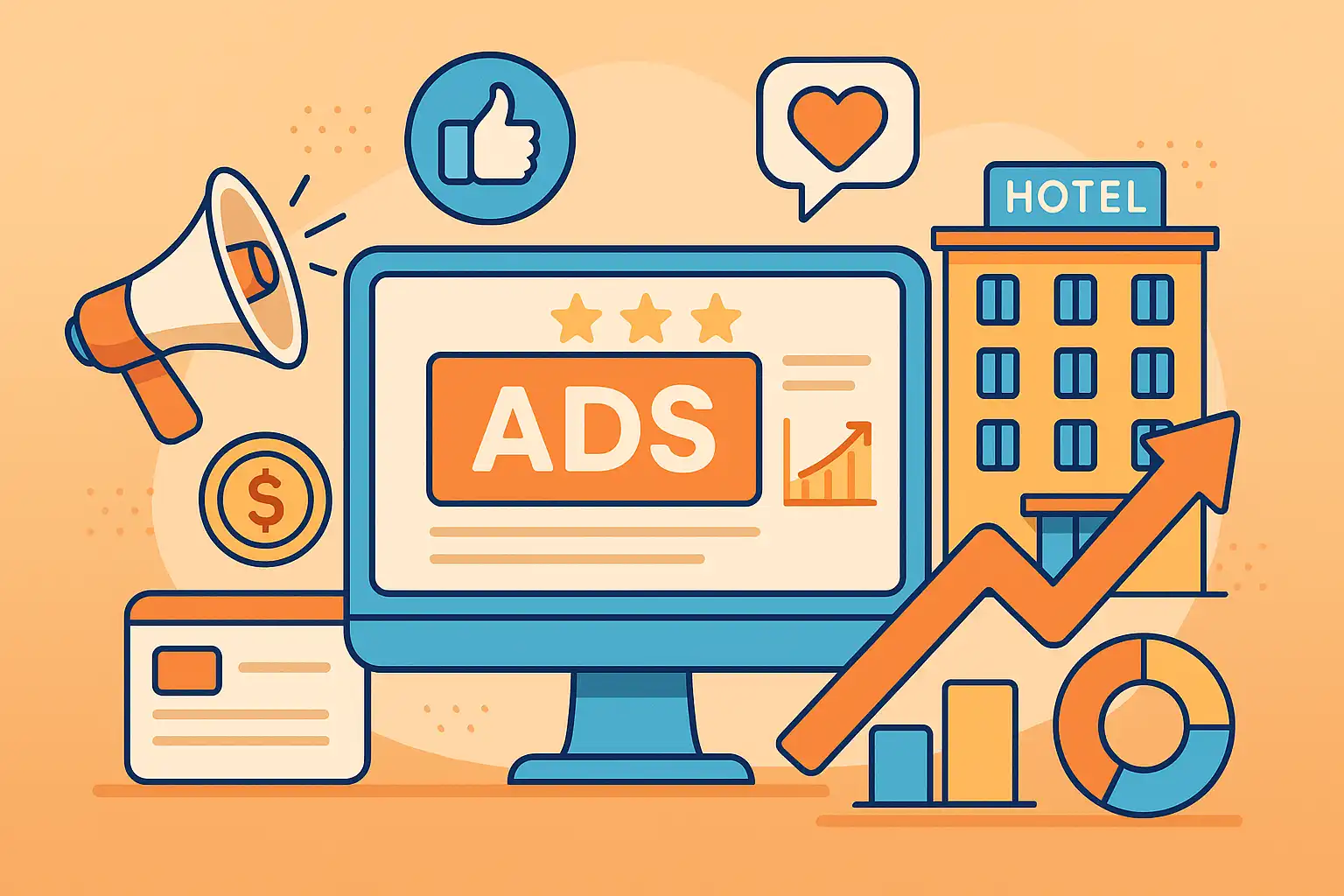Hotel Digital Marketing: Drive Bookings & Revenue
Oct 31, 2025
 Mika Takahashi
Mika TakahashiPopular Categories
Hotel Technology & InnovationHotel Operations OptimizationDigital MarketingIndustry TrendsRevenue ManagementHospitality Industry
Popular Categories
Trending Post

Hotel Walk Letter Template: Professional Guest Communication

Online Travel Agents: What They Are and How They Work

Hotel Security Systems: Modern Protection Solutions

Hotel Advertising: Complete Guide to Boost Bookings and Revenue

25 Hotel Marketing Strategy Ideas for 2025: Complete Guide

AI Reservation Agent: Revolutionizing Hotel Booking and Guest Experience

PMS Communication: Streamlining Property Management Through Effective Guest Messaging
Table of contents
The hospitality industry has experienced a digital revolution. Today, over 60% of hotel bookings happen online, and mobile devices account for about two-thirds of hotel website traffic. This shift means hotels need to rethink their marketing strategies to stay competitive in an ever-evolving market.
Hotel digital marketing is all about using online channels, platforms, and technology strategically to promote your property, build brand awareness, attract potential guests, and ultimately boost bookings — especially direct bookings that help maximize your revenue. Unlike traditional marketing, hotel digital marketing offers clear, measurable returns, precise targeting, and the ability to reach your audience exactly when they're planning their next trip.
In this comprehensive guide, we’ll walk you through the essential hotel digital marketing strategies that successful hotels are using to thrive in 2025’s competitive landscape. From search engine optimization and social media marketing to advanced analytics and emerging tech, you’ll learn how to craft a hotel digital marketing strategy that not only drives bookings but also builds lasting relationships with your guests.

What is Hotel Digital Marketing and Why It Matters
Simply put, hotel digital marketing is the art and science of using digital channels and platforms to promote your hotel, connect with potential guests, and encourage direct bookings through smart online marketing efforts. This essential strategy covers everything from your hotel website and hotel search engine optimisation to social media platforms, email marketing campaigns, and managing your online reputation.
Why is this so important? Because mobile devices now drive roughly two-thirds of global travel and hospitality website traffic. Guests today expect to research, compare, and book accommodations entirely online. If your hotel isn’t prioritizing digital channels, you risk missing out on a huge chunk of potential customers.
Here’s what makes digital marketing stand out from traditional methods:
- Cost-effectiveness with measurable ROI: Unlike print ads or billboards, digital marketing lets you track exactly which campaigns are delivering the best results.
- Precise targeting: You can reach your ideal guests based on demographics, interests, travel habits, and even their booking intentions.
- Real-time optimization: Campaigns can be tweaked on the fly to meet your marketing goals efficiently.
- Better customer journey tracking: You can follow guests from the moment they discover your hotel to the final booking, spotting opportunities to improve the process along the way.
The main hotel digital marketing channels every hotel should master include:
- Search engine optimisation for organic visibility
- Paid search and metasearch advertising
- Social media platforms for brand building and engagement
- Email marketing to retain guests and build loyalty
- Online reputation management across review sites
- Content marketing to establish your hotel as an industry leader
Getting these fundamentals right is the first step toward a winning hotel online marketing strategy that drives bookings and maximizes revenue in today’s competitive hospitality sector.
Essential Hotel Digital Marketing Channels
Search Engine Optimization (SEO) for Hotels
SEO is the backbone of any effective hotel digital marketing plan. It determines how visible your property is when potential guests search for accommodations online. Since travelers increasingly turn to search engines to find and research hotels, having a strong SEO strategy is critical for attracting organic traffic and boosting bookings.
Local SEO is especially important. When travelers type “hotel [location]” or similar geo-targeted searches, your hotel needs to show up high in organic results and on Google Maps. This visibility is key to attracting guests actively looking for places to stay in your area.
Effective keyword research means targeting both broad hospitality terms and location-specific phrases. Your hotel digital marketing plan should capture searches like:
- “hotels in [city name]”
- “[attraction name] hotels”
- “pet-friendly hotels,” “hotels with spa”
- Business and leisure travel terms tailored to your audience
On-page SEO involves optimizing meta tags, headers, and your site’s structure. Your hotel website should have compelling title tags and meta descriptions featuring relevant keywords that encourage clicks. Clear header tags help both search engines and visitors navigate your content easily.
Mobile-friendly design is non-negotiable. Google prioritizes mobile-first indexing, so your website must deliver a seamless experience no matter the device. With mobile devices dominating travel searches, your digital presence needs to keep pace.
Don’t overlook technical SEO elements like page speed and schema markup. Fast-loading pages prevent visitor drop-offs, and schema helps search engines better understand and showcase your hotel info in rich search results.
Google Hotel Ads and Paid Advertising
Google Hotel Ads have transformed how hotels appear in search results by showing real-time availability and pricing right within Google’s interface. This platform lets you highlight your rates, amenities, and booking options exactly when travelers are comparing hotels.
Beyond Hotel Ads, Google Ads lets you run targeted search and display campaigns across its vast network. These paid strategies help your hotel appear prominently for competitive keywords while controlling your ad spend and targeting.
Metasearch engines like TripAdvisor, Kayak, and Trivago offer extra visibility, letting hotels compete for traveler attention across multiple platforms at once. Participating in metasearch is a smart move, especially for independent hotels wanting to level the playing field with larger chains.
Social media ads on Facebook, Instagram, and TikTok open doors to reaching potential guests through eye-catching content. These platforms are great for brand awareness and engaging customers who might not yet be actively searching for a hotel.
Here’s a general budget guideline for hotel digital marketing:
| Channel | Recommended Budget Allocation | Primary Benefit |
|---|---|---|
| Google Hotel Ads | 35-45% | Direct booking conversion |
| Search Engine Marketing | 25-35% | Capture high-intent traffic |
| Social Media Advertising | 15-25% | Boost brand awareness |
| Metasearch Platforms | 10-15% | Increase competitive visibility |
Tracking ROI is key — keep an eye on cost per acquisition, booking conversion rates, and revenue attribution to get the most from your digital marketing efforts.
Email Marketing for Guest Retention
Hotel email marketing remains one of the most valuable tools in hotel digital marketing, delivering an average return of $38 for every $1 spent. It’s perfect for nurturing relationships, encouraging repeat bookings, and maximizing the lifetime value of your existing customers.
Build your email list by capturing addresses at multiple points — booking confirmations, website sign-ups, or offering local guides and exclusive discounts as incentives.
Segment your list by guest type, location, booking history, and preferences. Business travelers, leisure guests, and groups all respond best to different messages and offers.
Automated email sequences keep communication timely and relevant throughout the guest journey:
- Pre-arrival: Booking confirmations, check-in info, local tips, and upsell opportunities.
- During stay: Activity suggestions, special offers, and social media engagement requests.
- Post-departure: Feedback requests, future booking incentives, and ongoing relationship building.
Personalization using guest data makes your emails more effective. Dynamic content tailored to guest interests, A/B testing subject lines and send times—all help boost open and click-through rates.
Social Media Marketing Strategy
Social media is a powerful piece of any hotel digital marketing strategy, but each platform serves a different purpose and requires a tailored approach.
Instagram is perfect for visual storytelling—beautiful photos of your property, guest experiences, and local attractions. Use Stories, Reels, and IGTV to inspire travel and build brand loyalty.
Facebook offers community-building with detailed posts, event promotion, and direct customer service. Its advanced ad targeting lets you reach specific demographics and travel behaviors.
TikTok appeals to younger audiences with short-form videos that showcase your hotel’s personality, behind-the-scenes moments, and creative travel content. It’s a great platform for organic reach if you’re willing to get creative and authentic.
Encourage user-generated content by running photo contests, hashtag campaigns, or incentivizing guests to share their experiences. This authentic content provides powerful social proof and eases the content creation load on your team.
Partnering with micro-influencers who align with your brand and target audience can extend your reach and build credibility. Focus on genuine experiences rather than overt promotions.
Plan your content with a calendar to maintain consistency and align posts with seasonal offers, local events, and hotel happenings. Combine organic posts with paid social ads and retargeting to turn engagement into bookings.

Maximizing Direct Bookings vs. Third-Party Channels
Direct Booking Optimization
Direct bookings are the holy grail in hotel digital marketing. They offer higher profit margins by cutting out commission fees that typically range from 15-25% on third-party platforms. A strong direct channel strategy can boost revenue per booking by 15-20% compared to OTA bookings.
Your hotel website is the cornerstone here. Make sure your booking engine is seamless and easy to use, guiding guests smoothly from room selection to payment. Maintain rate parity across channels to build trust, and offer exclusive perks and incentives to encourage direct bookings.
Loyalty programs play a big role, offering benefits like:
- Room upgrades and late checkout
- Complimentary amenities
- Points toward future stays
- Member-only rates and discounts
- Priority customer service
Remarketing campaigns target visitors who browsed rooms or started booking but didn’t complete it, showing personalized offers and reminders across digital platforms to recover lost bookings.
Use first-party data to personalize experiences: recommend rooms, suggest upsells, and send targeted offers based on guest preferences and booking history.
Online Travel Agency (OTA) Management
While direct bookings are ideal, OTAs remain valuable for exposure to travelers who might not find you otherwise. Managing OTA presence wisely is part of a balanced hotel internet marketing strategy.
Major OTAs like Booking.com, Expedia, Agoda, and Hotels.com cater to different markets and regions. Know their strengths and optimize your presence accordingly.
Maintain rate parity to avoid price wars but reserve exclusive perks for direct bookings. Negotiate commission rates and terms to keep OTA bookings profitable.
Monitor and respond to reviews across OTAs diligently, as online reputation heavily influences booking decisions.
Content Marketing and Online Reputation Management
Hotel Content Marketing Strategy
Content marketing helps your hotel become a trusted authority while boosting SEO and engaging travelers through their decision-making journey. Address what your guests want to know and naturally weave in relevant keywords and calls to action.
Local area guides are a goldmine—share detailed info about nearby attractions, dining, shopping, and activities. These guides improve local SEO, help guests plan, and position your hotel as the local expert.
Seasonal content tied to holidays, events, and weather keeps your site fresh and relevant, capturing time-sensitive searches and encouraging bookings.
Visual content like virtual tours, 360-degree photos, and videos enhance engagement and help guests imagine their stay.
Blog topics to consider:
- Local festivals and events
- Travel tips for your destination
- Hotel amenities explained
- Guest stories and highlights
- Behind-the-scenes glimpses of your hotel’s personality
Distribute content across your website, social media, and emails to maximize reach. Repurpose content to engage different audience segments on their preferred channels.
Online Review Management
Online reviews carry immense weight—over 95% of travelers read them before booking, and more than 80% consider management responses. Managing reviews well affects your reputation, search rankings, and conversion rates.
Track reviews on Google, TripAdvisor, Booking.com, and Yelp with alert systems to respond promptly.
Automated review requests sent shortly after checkout can boost positive review volumes, especially when timed right.
Use personalized response templates to save time but always tailor replies to specific feedback.
Encourage reviews through post-stay emails, incentive programs, QR codes in rooms, and staff training.
Monitor hotel reputation with tools that analyze trends and sentiment, helping you spot improvement areas and track guest satisfaction.

Advanced Digital Marketing Tactics
Data-Driven Marketing and Analytics
Data turns hotel digital marketing from guesswork into precision-targeted campaigns that maximize revenue and improve guest experiences. Use analytics platforms to understand customer behavior, measure performance, and make informed decisions.
Integrate Google Analytics 4 with your booking system to track conversions accurately and see which efforts bring the most valuable bookings. Follow the entire customer journey to spot optimization opportunities.
Segment guests by booking patterns, stay duration, room preferences, seasonality, location, and price sensitivity for highly targeted campaigns.
Use predictive analytics to forecast demand, optimize pricing, and plan campaigns for high and low seasons.
First-party data collection is increasingly important as privacy rules tighten and third-party cookies disappear.
Create dashboards to monitor key metrics like website traffic, booking rates, marketing ROI, and guest satisfaction.
Mobile Marketing Optimization
With mobile devices driving most hotel website traffic and bookings, mobile optimization is essential.
Beyond responsive design, focus on mobile-first layouts, touch-friendly navigation, fast loading on cellular networks, and streamlined booking processes.
Simplify checkout with minimal forms, mobile wallet integration, and saved preferences for repeat guests.
Add click-to-call buttons, integrated maps, and push notifications for booking reminders and special offers.
Mobile apps may suit larger groups or hotels with loyal repeat guests, offering exclusive benefits and streamlined experiences.
Location-based mobile ads can capture last-minute bookings and promote on-site services.
Future of Hotel Digital Marketing
Privacy Regulations and Third-Party Cookie Changes
Privacy rules and the phaseout of third-party cookies in 2025 mean hotels must adapt their digital marketing strategies.
GDPR compliance requires transparent data practices, clear consent, and strong protection measures, especially for European markets.
Collecting first-party data and managing consent will be key to maintaining effective marketing.
Server-side tracking and conversion modeling offer privacy-compliant alternatives to cookie-based analytics.
Contextual advertising, focusing on content relevance and demographics, will replace detailed behavioral tracking.
Emerging Technologies and Trends
Artificial intelligence is transforming hotel digital marketing—from chatbots handling bookings to predictive analytics and personalized content.
Voice search optimization is growing as travelers use smart assistants; hotels should tailor content for conversational queries.
Virtual and augmented reality offer immersive ways to showcase your property and local area.
Dynamic pricing tools adjust rates in real time based on demand and competitor pricing.
Sustainability marketing resonates with guests seeking eco-friendly options; highlight your green initiatives to attract conscious travelers.
The hospitality industry’s digital landscape is evolving fast. Hotels that embrace integrated hotel digital marketing strategies combining SEO, social media strategies, data-driven insights, and emerging tech will lead the way in 2025 and beyond.
Success comes from viewing hotel digital marketing as a connected system designed to attract guests, simplify bookings, and build loyalty. Focus on direct bookings, leverage data, and maintain authentic connections with your audience to maximize revenue and foster repeat business.
As the hospitality sector embraces digital transformation, the winners will be those who adapt continuously while never losing sight of the core goal: delivering exceptional guest experiences that inspire loyalty and advocacy. This guide lays the foundation, but ongoing commitment to optimization and guest satisfaction is exactly that — the key to lasting success.
